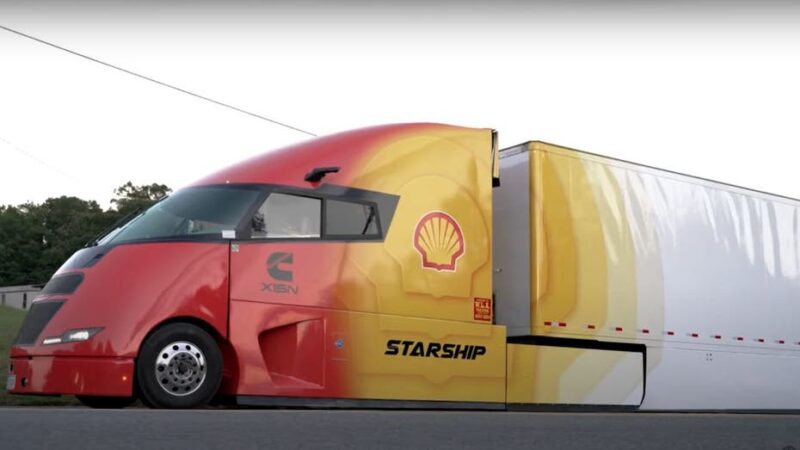The Future of Trucking: Shell’s Groundbreaking Starship 3.0

The Shell Starship Initiative has embarked on a transformative journey since its launch in 2018, aiming to revolutionize energy efficiency within the commercial trucking industry. With the introduction of the Starship 3.0, the initiative marks a significant shift toward sustainability, moving beyond traditional diesel engines to embrace innovative technologies.
Transitioning to Natural Gas Power
The Starship Initiative began with a clear vision: to create benchmarks for energy efficiency in commercial trucking. The first two versions, powered by diesel engines, showcased impressive fuel efficiencies relative to industry standards. However, the latest version, the Starship 3.0, introduces the advanced Cummins X15N natural gas engine. This engine not only boosts performance but also plays a crucial role in reducing harmful emissions, addressing growing environmental concerns and regulatory pressures facing the trucking sector.
The Cummins X15N engine, launched in 2024, is specifically designed for heavy-duty applications. It overcomes previous challenges associated with natural gas, providing power output comparable to diesel engines while achieving greater fuel efficiency and lower emissions. This transition is essential as the trucking industry strives to meet increasing environmental regulations.
Innovative Features of the Starship 3.0
The Starship 3.0 is equipped with state-of-the-art features that make it a standout in the trucking world. Below are some of the notable innovations that position this vehicle as a game-changer for the industry:
– **Natural Gas Powertrain**: The adoption of the Cummins X15N engine allows the Starship 3.0 to utilize various forms of natural gas, including renewable sources. This adaptability enhances its eco-friendliness and provides fleets with a practical solution for shifting away from conventional fuels.
– **Weight Reduction**: The new engine is approximately 500 pounds lighter than its diesel counterpart, which increases the truck’s freight-carrying capacity. This weight reduction, combined with lightweight construction materials, results in an impressive fuel efficiency of 183 ton-miles per gallon, far exceeding the industry average of 72.
– **Aerodynamic Design**: The aerodynamic shape of the Starship 3.0, characterized by its curved edges, significantly reduces wind resistance. Additional features, such as low rolling resistance tires and integrated aerodynamic panels, further enhance its efficiency.
– **Advanced Lubricants**: Shell has developed specialized lubricants to withstand the higher temperatures generated by natural gas engines. The truck utilizes Shell Rotella NG Plus SAE 5W-30 synthetic oil, specifically formulated for optimal performance, alongside advanced transmission lubricants.
– **Real-World Testing**: Input from experienced truck drivers like Brian and Eric Rector has been invaluable in refining the Starship’s design. Their hands-on experience with all three iterations of the truck has provided critical data for ongoing improvements.
Impressive Performance Metrics
The Starship 3.0 has achieved remarkable performance metrics, surpassing its predecessors with a freight ton efficiency that is 2.542 times better on a ton-miles per gallon basis. It also averages a fuel consumption of 9 mpg (diesel gallon equivalent) while hauling a maximum load of 80,000 pounds. The shift to renewable natural gas further enhances its environmental credentials, making it an attractive option for fleets focused on sustainability.
A Vision for Sustainable Trucking
With its innovative natural gas engine and impressive performance metrics, the Starship 3.0 exemplifies how technology can reshape the trucking industry while addressing environmental challenges. This initiative not only sets new standards for energy efficiency but also provides a practical pathway for fleets aiming to reduce their carbon footprint.
Engage in the Conversation
What are your thoughts on the transition to natural gas and other eco-friendly technologies in trucking? Do you believe these solutions effectively address environmental challenges, or should we explore alternative approaches? Share your opinions with us!
Stay Informed with Insights and Tips
For more technology tips and security alerts, consider subscribing to our newsletter. We value your feedback and are eager to hear what stories you’d like us to cover.
Copyright 2024 CyberGuy.com. All rights reserved.


